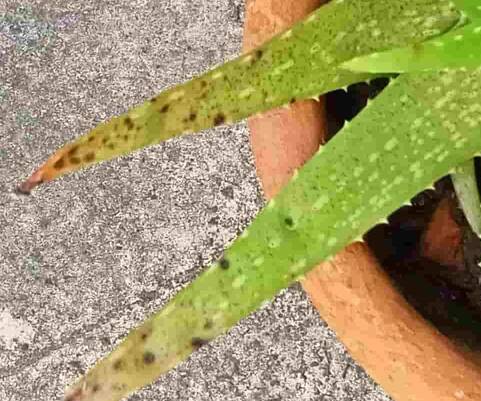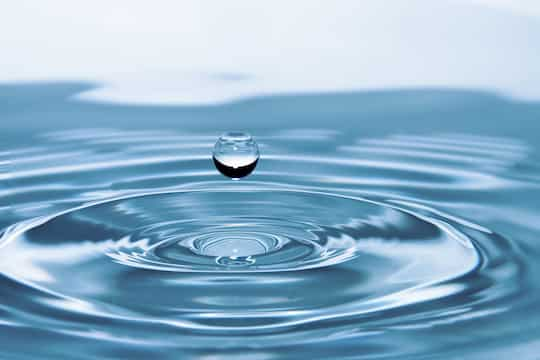Is Alkaline water good for Succulents? Succulents thrive well under slightly acidic conditions and hence instead of using alkaline water you should use water of slightly acidic pH for watering the succulents.
- Each and every plant thrives suitably well when you provide them with conditions similar to their native places. Succulents generally grow in drought-prone areas where they only receive water via rainfall.
- The pH of rain tends to vary from 5 to 5.5 as per the pH meter. So it is slightly acidic in nature.
Table of Contents
What is Alkaline Water in the first place?
The alkaline water is termed as alkaline because of its high pH levels. The pH meter contains a scale of 0 to 14 where 1 denotes extreme acidity and 14 extreme alkalinities. Anything around 7 is regarded as a neutral pH.
Even though many people believe that drinking alkaline water is good for health. it is still quite controversial and more research needs to be done regarding that. However just because something is thought to be beneficial for us does not necessarily mean that it has to be beneficial for plants also.
Is alkaline water OK for plants?
Alkaline water helps in increasing the alkalinity of the soil i.e, keeps the soil pH above 7. Hence not all plants can survive in such conditions. Only the plants that love sweet soil(alkaline soil) instead of sour soil(acidic) can survive properly under such conditions.
- Some of these alkaline soil loving plants include clematis, barberry, lavender, calendula, etc. However, if you are considering using alkaline water for succulents it can be a bad idea.
Succulents love slightly acidic conditions and grow best in the pH range of 6 to 6.5. These are the same conditions in which they grow in their natural habitats. So if you keep on using alkaline water for watering succulents and cactus, the soil will slowly turn alkaline and this in the long run will affect the growth of the plant.
- So it is totally okay to use alkaline water for growing plants that love alkaline conditions. But it is not suitable to use alkaline water to water plants like succulents that thrive best under acidic conditions.
How does alkaline water affect plant growth?
- The Soil Will slowly turn basic: Succulents can only thrive well under acidic conditions. However, they are highly adaptive plants and can even manage to grow under basic conditions. A succulent growing in alkaline conditions is much more susceptible to death than the one growing in acidic conditions.
- The alkalinity can make the soil deficient in essential nutrients: Increase in the soil alkalinity can lead to the deficiency of Magnesium and iron which are vital nutrients succulents extract from the soil. Both of these elements play an important role in their overall growth and flowering. Apart from this, phosphorus and zinc deficiencies can also occur because of this.

- Root development is affected: Roots are the most vital organs of any plant. They not only help in anchoring the plant to a particular place but also help in absorbing oxygen, water, and a variety of nutrition from the soil.
Hence succulents with well-developed roots have much better chances of survival than succulents with underdeveloped roots. Basic soil conditions can immensely restrict proper root development and can impair the root”s ability to absorb nutrients from the soil.
This will get directly reflected on the plant growth. The succulent growth will be stunted, white or brownish spots will occur on the leaves and the stems and the succulent will start shedding leaves and branches.
- The leaf color can change especially around the edges: The leaf color can change into yellow or brown and the overall look of the succulent can be quite pale.
What to do if you have been watering succulents and have no idea if the water is alkaline or acidic
- Check the soil pH: This is a great thing to do at least once in two years just before the start of the growing season. ( this is important in case you are growing your succulent outside in the garden soil)
Take a small shovel, dig a few inches of soil, and use that sample for the pH test. Get rid of unnecessary hard items and add sufficient water in it after putting it in a bowl so that it feels muddy.
Now add about a very tiny amount say about a half cup of vinegar into it and if it feels foamy, the soil is alkaline in nature. If nothing happens in this case then carry out the same process again but this time instead of vinegar add baking soda and see if any foaming occurs. If foams appear then it is acidic in nature. If you get no foamy or bubble formation in both cases your soil can be of neutral pH (source).
Alternatively, you can just use soil pH testing strips for this purpose.
You can watch the below video for more information on this topic.
- Purchase a pH testing toolkit and use this to test the pH of the water you use for watering your succulents.
- Check the succulent leaves for signs of discoloration. See if the leaves are rolling or curling down or not.
- See if the plant is shedding off leaves and branches more frequently than it normally should.
- Improper flowering or decrease in the blooming period of the succulent along with its stunted growth and off look can be symptoms of improper soil pH.
How do you treat alkaline soil in which your plants are sitting?
Before changing the soil pH or making it acidic from alkaline you need to know the current pH of the soil. this will allow you to better understand to what extent you need to add certain items in the soil to change the pH.
In case you are growing your succulents in the pot
If you doubt your soil is too much alkaline,
- You can go through the soil pH test mentioned above.
- You can check the succulent for signs of stunt growth or improper growth.
If you feel the soil is alkaline you can simply pluck the succulent out carefully and repot it in a new cactus mix soil. Here on you can be more careful regarding the water you use and everything will be just fine.
If you are growing your succulents in the garden soil
You need to add certain components that make the soil acidic in nature. This includes:
- Sphagnum peat(in small amounts as it soaks water)
- Organic mulches
- Aluminum sulfate (It is an acidic fertilizer that you should not use more than 5 pounds per 100 square feet).
- Sulfur rich substances
You can add them to the soil mix in smaller amounts. The organic components help in retaining water in the soil which is not something succulents like. So never add too much of these. Avoid using more than 2 pounds of sulfur for every 100 square feet. Anything more can harm the plant. Changing the soil pH is not a quick process and can take a fair bit of time. Also, the changes will be imminent with time (source).
- Using rainwater is a great way to somewhat increase the acidity of the soil.
Also in these scenarios, the kind of fertilizer you can use varies as per the succulent type. So it is always a great idea to consult with the local garden shop or nursery regarding the kind of components you should use for decreasing the alkalinity of the soil and explain to them the types of succulents which are growing there.
They can suggest use with the recommended fertilizers and their dosages as per the results of the soil pH test.
Alternatives to alkaline water you can use for watering succulents
Rain Water
Rainwater is the best watering option you can op0t for your succulents. They are by default slightly acidic in nature and are completely natural. Unlike tap water, they do not contain harmful chemicals in most cases, and moreover acts as a tonic for the succulents.
- They promote better root health and provides them with a fresh dose of oxygen and nitrogen. You can easily collect rainwater if your place gets rain frequently.
- And succulents don’t need to be watered more than once a week so a proper reserve of rainwater can last you for a long time.
Filtered Water
This is the second-best source of water you can use for watering succulents. In case your place gets infrequent rain then this can be a handy option.
If you use reverse osmosis RO filters you can even regulate the water pH. Filtered water is not only good for your plants but for you and your family as well.
- It helps in getting rid of harmful chemicals and contaminants.
- The great thing about these filters is that they do not get rid of all the minerals in the water, they will keep the essential ones and get rid of the unwanted ones.
Distilled water
Distilled water is basically free of any element other than the water itself. It is free of harmful chemicals, contaminants, and essential minerals. So it is totally neutral water which won’t provide succulent with any nutrition but won’t harm it as well.
- If you opt for this option you need to fertilize your succulents at least twice a year. You can also consider boosting soil fertility naturally from time to time.
Also read:
- Are Epsom Salts Good for Succulents? (Ultimate Guide)
- Is Coffee Ground Good for Succulents & Cactus?
FAQ
Is tap water alkaline?
Mostly the tap water is found to be neutral i.e, it ranges around pH 7. However, this varies widely from place to place. This is because the chemical treatment process is not the same everywhere and the mineral content of the water also changes from place to place.
The ideal way to determine this is by simply buying a pH testing toolkit and using the strips to determine the water pH as per the color gradation. Or you can also use pH digital meters.
What pH should water be for succulents?
Conclusion
Succulents have very low caring needs however they are really sensitive about their soil type and the water quality. This is because improper water quality can damage the soil which further will damage the growth of the root and that will directly affect succulent health. So always try to use rainwater or filtered water for your succulents.
You can also read the following posts if you wanna gain more insight on watering succulents in a better way:
- 5 Ways You Are Damaging Your Succulents using Tap Water
- 4 Facts to Know Before Using Springwater for Succulents & Houseplants
So what kind of water do you currently for watering the succulents? Do you have any extra queries? Feel free to comment below!
Cheers
